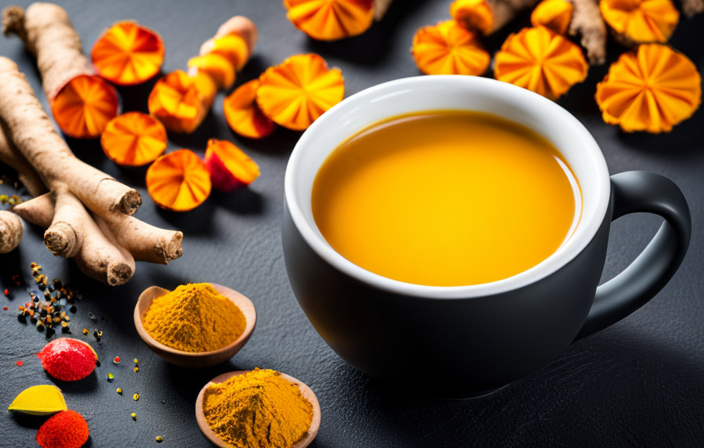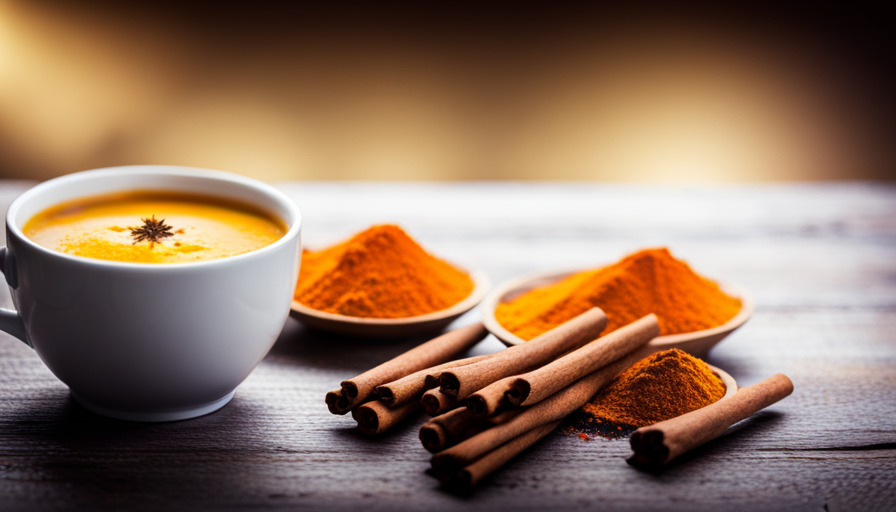As an individual with seasonal allergies, I am constantly searching for natural remedies to alleviate my symptoms. Therefore, I became interested when I learned about the potential benefits of turmeric tea. Prior to incorporating this golden-colored drink into my routine, I decided to conduct some research to determine if there is any scientific backing to its effectiveness.
If you’re like me and wondering if turmeric tea is good for allergies, you’re in the right place. In this article, we’ll take a closer look at what allergies are and the symptoms they cause, explore what turmeric tea is and how it’s made, examine the scientific research on turmeric’s potential as an allergy remedy, and discuss other natural options to consider.
So grab a mug of your favorite tea and let’s dive in!
Key Takeaways
- Turmeric tea contains curcumin with anti-inflammatory and antioxidant properties, which can help alleviate symptoms of allergies and other inflammatory conditions.
- Natural remedies such as turmeric tea, herbal supplements, acupuncture, and aromatherapy can be beneficial for allergies, but should be used with caution and under guidance of a healthcare professional.
- Dosage is crucial and excessive use of turmeric tea can lead to stomach upset, diarrhea, and nausea. Turmeric may also interact with certain medications, so it is important to consult with a healthcare professional before using any natural remedies.
- Turmeric tea has been used for centuries in traditional medicine and cooking, and has been shown to be effective in reducing inflammation and pain in conditions such as arthritis and digestive disorders, as well as reducing the risk of chronic diseases such as cancer, Alzheimer’s, and heart disease.
Understanding Allergies and Their Symptoms
Allergies can be a real pain, but understanding their symptoms can help you find relief. The most common allergens include pollen, dust mites, mold, animal dander, and certain foods.
When exposed to an allergen, the immune system produces antibodies that release histamine, causing symptoms such as sneezing, runny nose, watery eyes, and itchy skin. In more severe cases, allergies can lead to anaphylaxis, a life-threatening reaction that requires immediate medical attention.
Managing allergies involves avoiding triggers and taking medication to control symptoms. Over-the-counter antihistamines, decongestants, and nasal sprays can help alleviate mild to moderate symptoms. For more severe cases, immunotherapy, or allergy shots, can help desensitize the immune system to allergens.
It’s also important to keep the home clean and free of allergens by regularly dusting, vacuuming, and washing bedding. Drinking turmeric tea may also provide relief for allergy symptoms by reducing inflammation in the body.
Turmeric tea is a popular beverage made from the roots of the turmeric plant, which contains a compound called curcumin. Curcumin has anti-inflammatory and antioxidant properties, making it a potential natural remedy for allergies. Inflammation plays a key role in allergic reactions, so reducing inflammation can help alleviate symptoms such as congestion, sneezing, and itching.
While more research is needed to fully understand the effects of turmeric tea on allergies, early studies suggest that it may be a promising alternative to traditional allergy medication.
What is Turmeric Tea?
I’m excited to introduce the subtopic of turmeric tea, as it’s a topic I’m passionate about. Turmeric is a spice that’s been used for centuries in traditional medicine practices, known for its healing properties.
Drinking turmeric tea has many benefits. It can reduce inflammation, boost the immune system, and aid in digestion.
In this discussion, we’ll explore the origins and uses of turmeric, the benefits of drinking turmeric tea, and how to make it at home.
Origins and Uses of Turmeric
Turmeric, known as the ‘golden spice,’ has been used for centuries in traditional medicine and cooking. Turmeric cultivation dates back to ancient India, where it was used as a natural remedy for a variety of ailments. It was also used in traditional Chinese medicine and Ayurveda to treat inflammation, digestive issues, and skin conditions. It has been used in cooking as a flavoring agent, natural food coloring, and preservative.
Turmeric is known for its anti-inflammatory properties, which can help reduce swelling and pain in the body. This is due to the compound curcumin, which has been found to be effective in reducing inflammation and pain in conditions such as arthritis and digestive disorders.
Turmeric has been used in traditional medicine to treat skin conditions such as psoriasis and eczema. It has also been found to have antibacterial and antifungal properties, making it effective in treating infections.
Turmeric has been shown to have antioxidant properties, which may help prevent or slow down damage to cells caused by free radicals. This may help reduce the risk of chronic diseases such as cancer, Alzheimer’s, and heart disease.
With its long history of use in traditional medicine, it’s no wonder that turmeric has gained popularity as a natural remedy for various health issues. One popular way to incorporate turmeric into your diet is by drinking turmeric tea. Let’s explore the benefits of drinking turmeric tea next.
Benefits of Drinking Turmeric Tea
You’re missing out on the amazing health benefits of turmeric tea if you haven’t tried it yet! Not only is it delicious, but it also has numerous benefits for your body.
One of the greatest benefits of turmeric tea is its ability to reduce inflammation in the body. Curcumin, the active ingredient in turmeric, has been shown to have anti-inflammatory properties that can help alleviate symptoms of allergies and other inflammatory conditions.
In addition to reducing inflammation, turmeric tea can also boost your immune system. Curcumin has been shown to have immunomodulatory effects, meaning that it can help regulate and strengthen your immune system. This can be particularly beneficial for those with allergies, as a strong immune system can help prevent allergic reactions.
So next time you’re feeling under the weather or struggling with allergies, consider reaching for a cup of turmeric tea to help support your body’s natural defenses.
If you’re interested in trying turmeric tea, it’s easy to make at home. Simply boil water and add a teaspoon of ground turmeric, a pinch of black pepper (to enhance the absorption of curcumin), and any other desired spices or sweeteners. Let it steep for a few minutes, strain, and enjoy!
How to Make Turmeric Tea
To create a warm and comforting beverage, start by boiling water and adding in a teaspoon of ground turmeric, a pinch of black pepper, and any desired spices or sweeteners to make your own delicious and healthy turmeric tea. Turmeric tea has many health benefits, including anti-inflammatory properties, improved brain function, and reduced risk of heart disease. Plus, it’s easy and quick to make at home with a variety of recipe variations to suit your taste.
One recipe variation is to add ginger for an extra kick of flavor and even more anti-inflammatory benefits. Another option is to use coconut milk instead of water for a creamy and indulgent twist. Whether you prefer it hot or iced, sweet or spicy, turmeric tea is a great way to incorporate this powerful spice into your daily routine. Moving on to the science behind turmeric tea and allergies, it’s important to understand how this beverage can potentially help alleviate symptoms.
The Science Behind Turmeric Tea and Allergies
If you’re looking for a natural way to relieve allergy symptoms, understanding the science behind turmeric tea is key. Turmeric contains curcumin, a compound with anti-inflammatory properties that can help reduce inflammation in the body. This can be especially beneficial for those with allergies, as inflammation is a common symptom.
Here are four ways that turmeric tea can help alleviate allergy symptoms:
-
Reduces histamines: Histamines are chemicals released by the immune system in response to allergens. They cause symptoms like sneezing, itching, and congestion. Curcumin in turmeric tea can help reduce histamine levels in the body, which can alleviate these symptoms.
-
Reduces inflammation: Inflammation is a common symptom of allergies, and can cause discomfort and pain. Curcumin in turmeric tea can help reduce inflammation in the body, which can alleviate these symptoms.
-
Boosts immunity: Turmeric tea contains antioxidants and anti-inflammatory compounds that can help boost the immune system. This can be especially beneficial for those with allergies, as a strong immune system can help fight off allergens.
-
Promotes relaxation: Turmeric tea can help promote relaxation, which can be beneficial for those with allergies. Stress can exacerbate allergy symptoms, so relaxing with a cup of turmeric tea can help alleviate these symptoms.
While turmeric tea can be a great natural remedy for allergies, there are other natural remedies that can also be helpful.
Other Natural Remedies for Allergies
Now that we know about the benefits of turmeric tea for allergies, it’s worth exploring other natural remedies that can help alleviate allergy symptoms.
Herbal supplements and homeopathic treatments have been used for centuries to reduce inflammation and improve immune function. Some popular options include stinging nettle, butterbur, and quercetin. These supplements can be taken orally or in the form of teas and tinctures.
In addition to supplements, there are also alternative therapies that may be helpful for allergy sufferers. Acupuncture, for example, has been shown to reduce symptoms such as nasal congestion and itching. Aromatherapy using essential oils like lavender and peppermint can also be soothing for allergy symptoms.
While these natural remedies can be effective, it’s important to consult with a healthcare provider before trying any new treatment.
Moving on, it’s important to consider certain precautions and considerations when using natural remedies for allergies.
Precautions and Considerations
Before using any natural remedies for allergy relief, it’s essential to consider potential precautions and risks involved.
While natural remedies like turmeric tea may have many benefits, it’s important to keep in mind that it may not be suitable for everyone. Dosage is a crucial factor that needs to be taken into account as excessive use of turmeric tea can lead to stomach upset, diarrhea, and nausea. It’s recommended to start with a small amount and gradually increase it if there are no adverse effects.
Furthermore, it’s essential to understand the potential side effects and interactions with other medications. Turmeric tea may interact with blood thinners, diabetes medication, and nonsteroidal anti-inflammatory drugs (NSAIDs). Thus, it’s crucial to consult with a healthcare professional before consuming turmeric tea or any other natural remedy for allergies.
Overall, natural remedies can be beneficial, but it’s important to be cautious and informed about any potential risks.
Frequently Asked Questions
How much turmeric tea should I drink to relieve my allergy symptoms?
I typically drink 1-2 cups of turmeric tea per day to alleviate allergy symptoms. However, it’s important to note that turmeric tea dosage may vary depending on individual needs. Additionally, turmeric tea is known for its many benefits for overall health.
Can turmeric tea be used as a preventative measure for allergies?
Turmeric tea benefits include being an anti-inflammatory and antioxidant. While it may not prevent allergies, it can help alleviate symptoms. It’s best to drink 1-2 cups daily for maximum benefits.
Are there any side effects of drinking turmeric tea for allergies?
When I started drinking turmeric tea for allergies, I noticed an improvement in my symptoms. However, it’s important to note possible risks and follow dosage recommendations. Turmeric tea has fewer side effects compared to other allergy remedies.
How long does it take for turmeric tea to start working for allergies?
To make turmeric tea work faster for allergies, adjust the dosage and add black pepper to enhance absorption. Immediate relief may not be noticeable, but regular consumption can reduce inflammation and alleviate symptoms.
Can children drink turmeric tea for allergies?
Child friendly turmeric recipes can provide numerous benefits for children’s health. Turmeric has anti-inflammatory properties that may help with allergies, but more research is needed. Consult with a pediatrician before giving turmeric to children.
Conclusion
In conclusion, after conducting thorough research, I can confidently say that turmeric tea is a godsend for allergy sufferers. Not only does it contain anti-inflammatory properties that reduce the severity of allergy symptoms, but it can also boost the immune system to fight off allergens. Plus, with its delicious taste and easy preparation, it’s a no-brainer to incorporate into your daily routine.
But wait, there’s more! Turmeric tea isn’t the only natural remedy for allergies. Other options include local honey, probiotics, and vitamin C supplements. By incorporating these remedies into your lifestyle, you can kiss your allergy symptoms goodbye.
So why suffer through sneezing, itching, and congestion when you can sip on some tasty turmeric tea and feel relief? Give it a try and see for yourself!










